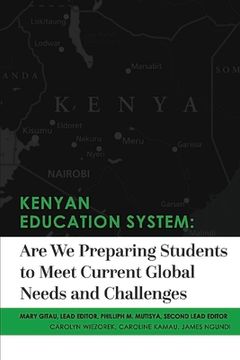Kenyan Education System: Are We Preparing Students to Meet Current Global Needs and Challenges: Volume 1 (en Inglés)
Reseña del libro "Kenyan Education System: Are We Preparing Students to Meet Current Global Needs and Challenges: Volume 1 (en Inglés)"
After 70 years of direct rule by the British Colonialism, Kenyan became independent in 1963. Since independence from the British colonial rule, Kenyans had not only been alienated from one another based on ethnicity (Tribal boundaries) but also by leadership through divide and rule process. Kenya's post-independence faced an enormous task of trying to unite its people to start seeing each other as one people and not as different groups with unique identities and cultures. However, colonialism had created oppressive conditions among the Kenyans that were main obstacle to uniting people who existed in their own regional areas along ethnic and language boundaries. Education process for the Kenyans and most of the African continent has been guided by foreign view that alienates the indigenous people along their ethnic boundaries, their ethos, mores, philosophy and psychology. Thus, internalization of differences continued to fester orchestrated by empty slogans by politicians, government policies, and laws that have shaped education system creating skepticism among leaders and educators. As are result "little or none" inter-ethnic integration in political and educational process was established. However the slogans used by both politicians who were also the policy makers aimed at uniting the nation. Slogans such as "Harambee", "Uhuru na kazi", or "Elimu ni nguvu-Education is power" sounded good but rung hollow that are now rarely heard nor recognized anymore. Latest implementation of devolution and the new constitution has created a need for developing a "New Normal" because it is the first time the Kenyans have to identify with their own identity and shift from traditional cultural laws- contradicted by western thought in their interpretation and implementation to a constitutional law that has Kenyan context an identity. Such a transformation however, requires a carefully developed framework that would also lead to developing a unified ideology to guide the new trajectory of the country's governance and its educational, economic, and political process conceptualized in a conscious approach that informs and engages the citizenry. This chapter addresses the need to establish as study that explores the perceptions and attitudes of Kenyans. Also, the study should be designed to measure the implications on social change, the impact of the conceptualization of new ways (New Normal) the new world-view in socialization and identity development for Kenyans as they implement the new constitution and devolution. The discussion concludes with a proposal of a model that can be applied reconceptualization of education in the context that promotes positive cultural socialization and education, especially in higher education. Mutisya, et al (2014) developed a model that came to be known as "Comm-Uni-Versity Model", a transformational approach in revisioning education process, education institutional development, and social change. The conclusion in this chapter proposes reconceptualization of the devolution to include the Kenya Diaspora as part of identity and socialization as a civic imperative as a means to tapping the Diaspora experience as we navigate the Global village.

